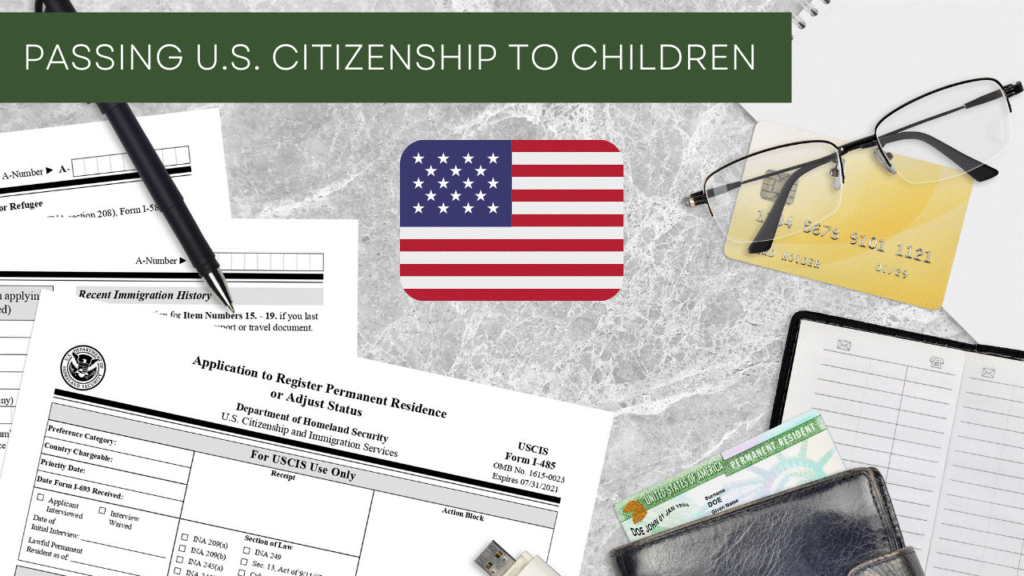
Immigrants are often concerned about the risk of losing their US. citizenship when they pass it to their children. However, there are some exceptions that allow for this to happen without any consequences.
The United States Citizenship and Immigration Services (USCIS) announced a significant change to the law that will allow children born abroad to US. citizens to automatically gain citizenship when their parents naturalize, regardless of where they were born.
The purpose of US. Citizenship test is to protect the American soul, promote the welfare, and secure rights of the citizens of the United States. Such protection is achieved by granting citizenship to individuals who have met all the legal requirements.
In order to pass your US. citizenship to your children, you must be a lawful permanent resident and meet certain requirements such as being married to a citizen or having a child who is a citizen by birth or naturalization after the age of 18 years old.
Birth Abroad to US. Citizen Parent
Table of Contents
The United States is a country that welcomes all immigrants with open arms and provides them with the opportunity to become a citizen. However, birth abroad to a US. Citizen Parent can be a complicated process for both the parents and their children..
Children born abroad to American parents are now able to apply for naturalization, but it’s important that they meet certain requirements before they can become citizens.
If you are interested in adopting a child from abroad, you should know that there are several countries around the world that allow international adoptions. This includes China, Russia, Ethiopia, Haiti, Guatemala, South Korea and Ukraine among others.
Birth to Parent that Naturalized Later for American citizenship
The naturalization process can be difficult for some immigrants. They are required to go through a lengthy process that includes filling out paperwork, attending an interview, and paying fees. This can be a lot of work for someone who just wants to live in the United States with their family.
A new program called “Birth to Parent” is being introduced by the United States Citizenship and Immigration Services (USCIS) to help immigrant families that have been waiting for years on their naturalization cases. The program provides a one-time payment of $1,500 towards the cost of filing the application and helps with other related costs like attorney fees, translation services, and travel expenses.
This change in policy is a result of the new Child Citizenship Act of 2000, which allows children to acquire citizenship at birth if one of their parents is a US. citizen.
What is the Process of Passing US. Citizenship to Your Children?
Nowadays, it is not uncommon for people to want to give their children and grandchildren US citizenship. However, there are many complicated processes involved in the process of becoming a US citizen.
The process of passing US citizenship is a long and complicated one that involves several steps. The process usually starts with the immigrant applying for a visa and then waiting for the green card application to be approved. Once that happens, they can apply for naturalization, which is when they become a US citizen.
In order to become a US citizen, you must meet certain requirements such as being at least 18 years old, living in the United States continuously for at least five years before you apply, having good moral character and an attachment to the country’s values as well as speaking English fluently.
The process of passing US citizenship to your children is not an easy task, but it is possible. There are a few requirements that you must meet in order to be eligible.
First, the child must be born on US soil and have at least one American parent.
Second, the child must have lived in the United States for at least five years prior to applying for citizenship.
Third, you will need to show that you can support your child financially by providing proof of employment and income.
Finally, if you are married to an American citizen or if your spouse has been a legal resident for at least five years before your child’s birth, then you can petition for citizenship on behalf of your spouse as well.
Laws of US. Citizenship to Children
The United States is a nation of immigrants. In order to be a citizen of the United States, you must be born in the country and your parents must have been citizens at the time of your birth.
The following are some laws that govern US. citizenship for children
A person born in the United States who is a citizen of another country under the laws of that country, who later acquires US. citizenship under section.
In the case of an adoption, it is possible that the child may be a US. citizen or not, depending on the circumstances of the adoption.
Some countries, like Mexico, do not allow children to acquire citizenship automatically by birth. However, such countries have treaties with the United States that allow US. citizens to acquire dual citizenship, which children of US. citizens may also do.
Other countries allow children to acquire citizenship automatically by birth
The Immigration and Nationality Act (INA) defines a child as any person under 18 years old who does not have the full legal capacity to enter into contracts, or any person under 21 years old who has not graduated from high school or obtained a general educational development certificate (GED).
If you follow every single step and rules of US. Citizenship to Children, your Little boss may be get an US. Citizenship.
Frequently Asked Questions (FAQ)
About Citizens tests
Citizens tests provides simple, affordable, step-by-step guidance through USCIS immigration applications. Individuals, attorneys and non-profits use the service on desktop or mobile device to prepare immigration forms accurately, avoiding costly delays. Citizens Tests allows users to try the service for free and provides a 100% money-back guarantee that USCIS will approve the application or petition. We provide support for the Green Card Replacement Application (Form I-90), US Citizenship Application (Form N-400), and several other USCIS forms.
Want to sign up for our weekly newsletter covering all things immigration?
You may also know this

